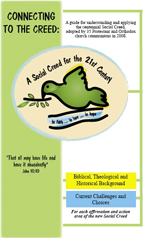With the Labor Day weekend approaching and the U.S. Congress poised to take up a number of “social safety net” issues when it returns from summer recess, the Presbyterian Church (U.S.A.)’s Advisory Committee on Social Witness Policy has released three related resources authorized by last summer’s 218th General Assembly.
“Connecting to the Creed” is a new guide to help Presbyterians study and discuss “A Social Creed for the 21st Century,” which was adopted by the Assembly by a 5-1 margin. The new creed — which ACSWP took the lead in developing — marks the centennial of the adoption of the “Social Creed of 1908,” which addressed social crises growing out of the industrial revolution, such as child labor, workplace health and safety, and dislocations caused by the growth of northern industrial cities.
The new creed — which has been adopted by 35 denominations and the National Council of Churches — provides “a message of hope for a fearful time” by “offering a vision of a society that shares more and consumes less, seeks compassion over suspicion and equality over domination, and finds security in joined hands rather than massed arms.”
It calls for equal pay for comparable work, protection from dangerous working conditions, criminal rehabilitation through restorative justice, an end to the death penalty, tax and budget policies that reduce disparities between rich and poor, affordable housing, sustainable use of resources and just immigration policies.
“Connecting the Creed” includes biblical, theological and historical background on the creed and a study guide for addressing “current challenges and choices” related to the recommendations contained in the creed.
Patty Chapman, a member of the Social Creed study team who designed the resource, has also designed publicity resources for use by churches and governing bodies desiring to organize studies of the creed.
The other booklets have also just been produced — on Serious Mental Illness and Homelessness. Both grow out of resolutions also adopted by last summer’s General Assembly.
Both booklets don’t just reflect the substance of the PC(USA)’s policies on serious mental illness and homelessness, but include case studies and programs that have been developed by Presbyterians and others to address the issues.
For example, the homelessness booklet describes Presbyterian participation in organizations such as Habitat for Humanity. Pictures on the cover include those of ministries to and with the homeless, including those developed by members of the study panel and PC(USA)-related groups like the Open Door community in Atlanta.
Introducing From Homelessness to Hope: Constructing Just, Sustainable Communities for All God’s People, General Assembly Stated Clerk Gradye Parsons writes: “Hope for homeless persons — often sisters and brothers in Christ, and increasingly whole families — is the cornerstone of this resolution, and there is frank recognition of the personal difficulties that contribute to, and are reinforced by, homelessness. Holistic responses are here, along with practical guidance, examples, and many resources for caring and effective action. At the same time, this holistic approach leads inevitably to the social change necessary for justice, for which we need those “just, sustainable communities” of the title. The days are over when individual home ownership could be the whole of US housing policy. Beyond its wise ‘first responder’ guidance, this report points toward a more coherent housing policy that includes rentals, on-site supportive care, and much more.”
About Comfort My People — the resource on the serious mental illness resolution adopted by the Assembly — Parsons says: “This policy statement is the result of a three-year development process that included wide consultation and participation throughout the church. It draws upon biblical sources and nsights from the Reformed tradition in renewing Presbyterian understandings of how we live as a church that welcomes persons living with serious mental illnesses and their families. After offering comprehensive and working definitions of mental illness and serious mental illness, the paper provides an historical account organized around two major biblical themes.
“The first theme is ‘The Land of Exile,’ which explores the difficulties and injustices endured by people with serious mental illness. The experience of mental illness disorders people’s lives in ways that exile them from themselves, their families, and their communities. The second theme, ‘God’s Call to Comfort,’ focuses on appropriate ways congregations can minister with and to people with a serious mental illness.
“Woven throughout the paper are stories that illumine and give pastoral and personal depth to this policy. These stories focus on real life challenges experienced by people living with a mental illness or a serious mental illness ... I pray that we may find the courage to go into the diverse places of exile to comfort and minister with God’s people affected by mental illness.”
For more information about how to acquire these resources, visit the ACSWP Web site.

